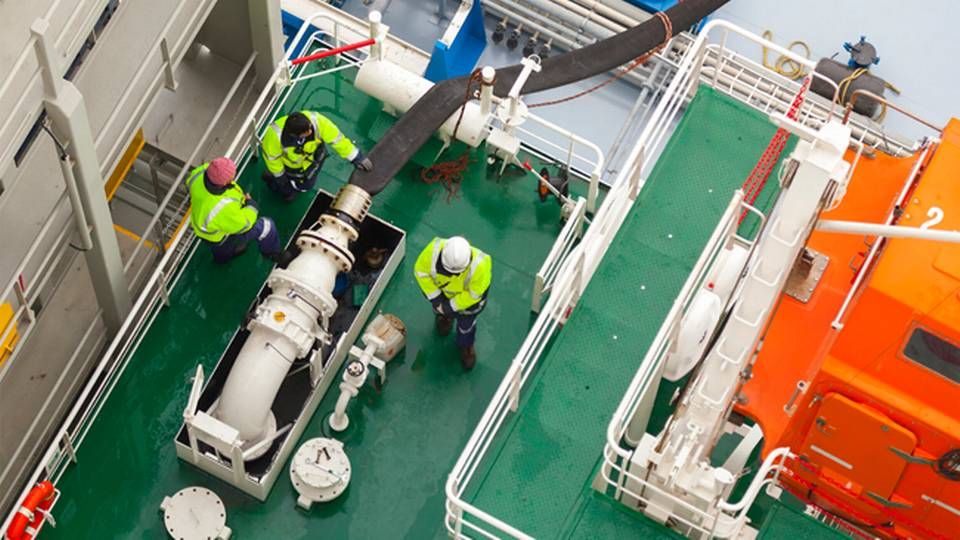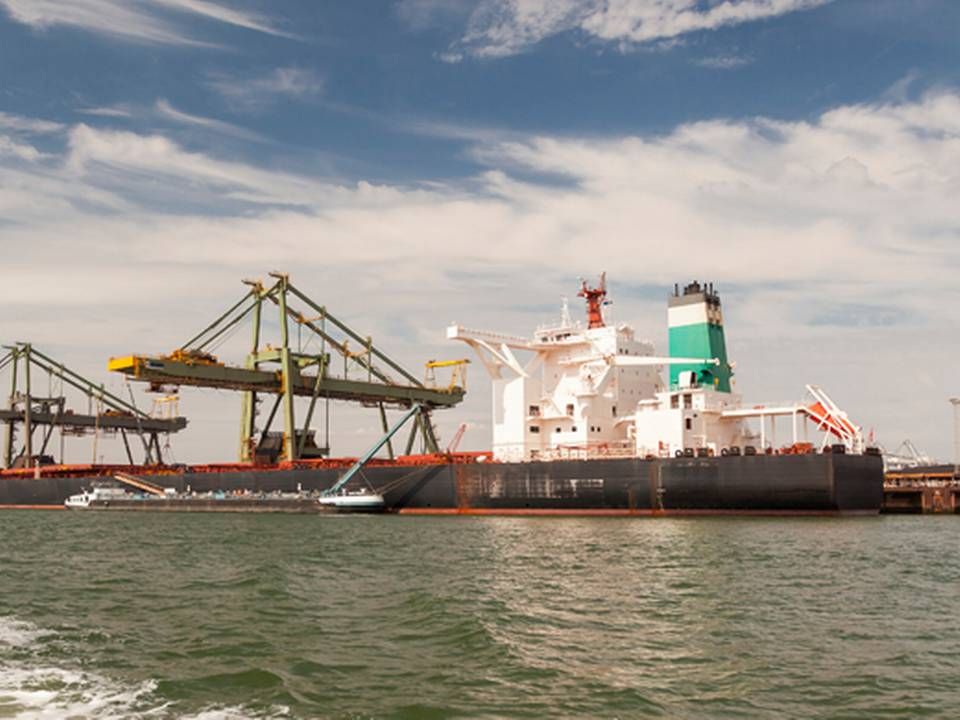Prosecutor calls for four year prison sentences in bunker fraud case

Updated 2:48 pm CET to include the prosecutor's closing procedure on Friday
It was simple. When the customer had ordered 1,000 tons of marine fuel, he was only supplied with 800 tons, in good faith that he had received 1,000.
This is how a former employee of the fraud-charged Danish bunker company explained the process when he gave his testimony on Thursday in the district court of Kolding, Denmark, where he was examined via video link to the Danish General Consulate in Dubai.
The former employee is one of the witnesses for the Danish Attorney General's office for fraud and economic crimes – generally known as the Danish Fraud Squad (SØIK) – in the case against the bunker company, which is accused of systematic defrauding of a Malaysian customer, Pacific Inter-Link, for about USD 3.9 million from 2010 to 2013.
The depositions were supposed to have been concluded before summer, but both of the prosecutor's key witnesses, counting the former employee as well as the head of internal auditing at Pacific Inter-Link, Sriram Iyer, were no-shows, and the case had to be postponed for a second attempt.
This finally happened on Thursday when both witnesses were present via video link to Dubai and Malaysia, and as such prosecutor Knud Damgaard Kisbye was finally able to back up his claims with support from the witnesses.
Sriram Iyer from Pacific Inter-Link, which trades in palm oil, explained that the company does not own its own vessels to transport the palm oil, but instead charters vessels and crews from external suppliers.
However, Pacific Inter-Link was still the one to pay for and order the fuel, and the executive explained that a time came when they began to wonder about the fuel efficiency on two of the vessels.
The Danish oil company was a supplier to both vessels but the actual bunkering of the fuel went through subcontractors.
Each fueling was concluded with a delivery bill and the Pacific executive stated that original delivery bills were obtained that showed completely different amounts than those for which Pacific had been billed by the Danish company.
"We asked for an explanation from (anonymous company) but that didn't help much. Then we went to the police," Sriram Iyer explained.
The case was reported to the Danish financial crimes unit on March 3rd 2014, and according to the executive, Pacific then froze payments to the Danish company worth about USD 400,000.
Millions to withdraw charge
Pacific withdrew the charge already in July.
The company's CEO Fouad Hayel Sayed wrote to the Danish Fraud Squad that the company would continue its own investigation of the case and that the Danes had presented them with comprehensive documentation.
In other words, there was no longer a basis for maintaining the criminal charges.
"We would like to take this opportunity to express our gratitude for the collaboration with the Danish police in this matter, and we apologize for any inconvenience that has arisen in this regard," wrote Fouhad Hayel Sayed.
What actually happened was that Pacific had reached a secret settlement in Kuala Lumpur in Malaysia with the Danish oil company and was paid a sum of millions.
Sriram Iyer was only willing to reveal the actual amount if the judge could promise that he would not be prosecuted later on. The judge decided that this was not necessary, because it had emerged previously in the case that the oil company had settled for USD 3.8 million.
"Was the settlement conditioned on withdrawing the criminal charges," the prosecutor asked.
"Yes, it was."
The Pacific executive explained that CEO Fouad Hayel Sayed had been in a closed meeting with the management of the Danish company. Sayed had been showed certain documents that the witness did not know the content of.
"So what was the reason for withdrawing the charge?"
"It was because we were given money, and because our CEO was shown some documents at a closed meeting," he explaiend.
According to the Danish unit for financial crimes, they had tried to call on Fouad Hayel Sayed as a witness, but because it was communicated that he was traveling for the next month, they dropped it.
Mystery deepens concerning role of tax shelter in fraud case
When Pacific withdrew the charges, the police had already raided offices and found material which contributed to the decision to continue the investigation.
The man, who to a large extent was in contact with the customer Pacific Link representing the Danish oil company, was the former employee now giving his testimony from the Danish Consulate General in Dubai.
He was employed as a trader for the Danish oil company until February 2012, and he explained that the job of supplying to Pacific was won by offering a price that in fact was unprofitable.
Subsequently, the oil company did make a solid profit on Pacific and it has previously emerged that the oil company made more than USD 149,000 on one single delivery.
According to the former trader, it all took place as follows: When Pacific ordered a certain amount of oil, the trader was told by superiors to order a smaller volume.
ShippingWatch and Danish media Finans have been in touch with the former employee's superior, who no longer works at the company.
However, he declines to comment.
According to the financial police, they have attempted to call on him as a witness but, because the case was postponed, the decision was made to prioritize the two witnesses abroad and not call on the former superior.
The defense had maintained throughout the case that no one was defrauded and the "missing" amount of fuel was supplied via another subcontractor - tax shelter Templar located in Saint Vincent & The Grenadines.
The former trader explained that he never ordered oil from Templar, and he had not heard of the company until he was interrogated by the Danish police unit for economic crimes.
On the contrary, he received a call in the middle of the night one time, because an inspection was coming to one of Pacific's vessels.
"I was supposed to call the physical supplier (subcontractor, -ed.) right away because now they had to deliver the quantity that was ordered," he explained.
Bunker company made big profit on alleged fraud
When questioned by the defense, the former employee acknowledged that he did not know if his supervisor had done anything concerning these deals. He only knew that he himself had not ordered oil from Templar.
The defense attorney presented the case as the former employee having a clear revenge motive.
After leaving the oil company in 2012, the company had reported him to the police due to a number of transactions with a company in Angola.
Specialists from PwC had reviewed computer systems and found material including chat-conversations regarding payments that were to be divided and sent in different directions.
"There is a clear motivation of revenge. Before (the witness) contacted the police, there was a charge against him," the defense attorney, Jacob Skude Rasmussen, argued in reference to the former trader contacting the police himself in 2014 with his knowledge about the case.
The former employee confirms this to ShippingWatch and Finans.
He explains that Pacific contacted him when the company had gathered enough documentation, and they met in Dubai where the former trader told them what he knew.
Then Pacific Inter-Link encouraged him to contact the Danish police unit for economic crimes.
He did.
Charge dropped
The police ultimately dropped the charges in the case launched by the oil company after he was fired.
The defense also highlighted that he had started his own company in the same field, although the defense and the witness disagreed about whether or not this company was in direct competition with his former employer.
This could thus provide further motive for obstructing his former employer, according to the defense, although the employee before giving his testimony had been reminded by the judge that he would be penalized for lying.
The hearing this Thursday concluded the witness testimonies in the case. On Friday, the case continues with the process where the Fraud Squad reveals which sentence it wants for the company and the two executives which are likewise charged.
Prosecutor calls for prison sentences of no less than four years
In his closing procedure on Friday, prosecutor Knud Damgaard Kisbye called for prison sentences of no less than four years and a significant fine for an unspecified figure in the millions DKK.
The procedure constitutes the final part of the criminal case, in which prosecutor as well as the defense team explain to the judge and lay assessors how they believe the case and its evidence should be interpreted.
In addition to the fine and prison sentences, the prosecution also wants the gains from the fraud confiscated and the two executives barred from participating in the management of companies with limited liability in Denmark as well as abroad.
Witnesses missing in criminal case against Danish bunker company
Witness in criminal case: Sale of cheap bunker oil was risk-fraught





















